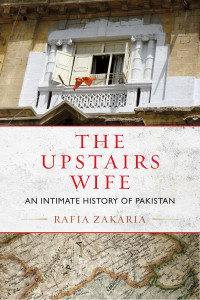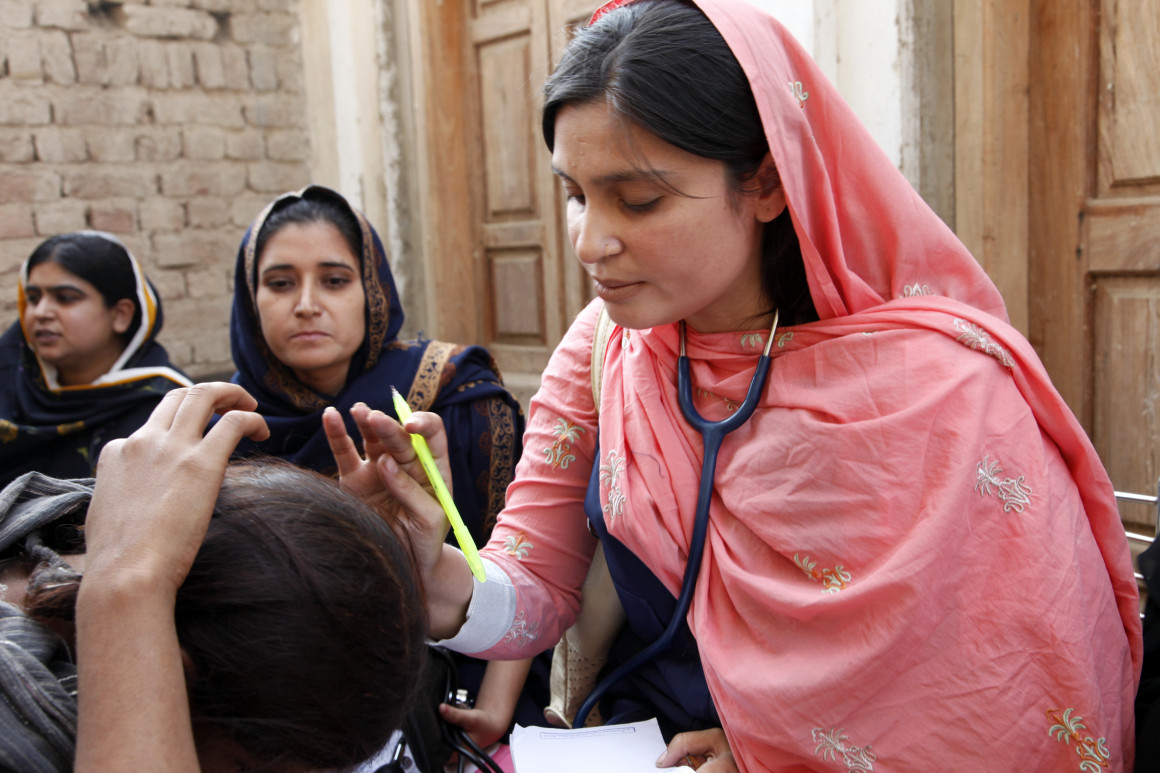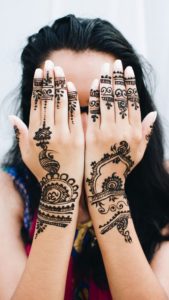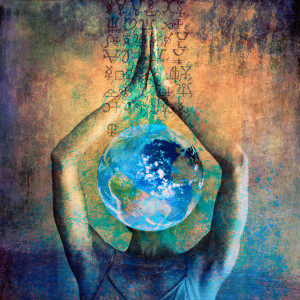Often I’ll judge a book by how sad I am to see it end. As I neared the last pages of Rafia Zakaria’s new book, “The Upstairs Wife: An Intimate History of Pakistan,” I found myself slowing my pace, not yet ready to give it up. But the sadness was more complex than usual. It was the sadness of reaching an ending that isn’t truly an ending: The question of where Pakistan goes next and what happens to its women is still very much up in the air. That story is being written day by day.
At the book’s core is Zakaria’s aunt Amina, whose husband takes a second wife in 1986 and sends her to live upstairs in a separate apartment. Around that personal conflict swirl the political struggles of Pakistan: the hopeful birth of the country in 1947 and its early women’s right efforts, the Islamization and misogynistic laws of the 1980s, and the rise and fall of Pakistan’s first female prime minister, Benazir Bhutto, whom Zakaria calls “the freest woman we knew.” In the process, Zakaria offers us a powerful glimpse into the hidden corners of Pakistani life, taking the whispers from behind closed doors and giving them voice.
 We talked to the author, attorney, and human rights activist about the lives of Pakistani women, the rise of polygamy, and her bid to influence the collective memory of her country.
We talked to the author, attorney, and human rights activist about the lives of Pakistani women, the rise of polygamy, and her bid to influence the collective memory of her country.
You’ve written a brave book, both a fascinating history of Pakistan and an intimate memoir of the women in your family. What made you give voice to this story?
I’ve been writing for DAWN, Pakistan’s largest English-speaking newspaper, since late 2009, and I write primarily about women’s issues every week. The years since 2009 have been very grim ones for Pakistan and particularly for Pakistani women. … I feel like the Pakistani news narrative is very much dominated by the Taliban, by terrorism, by violence. I wanted to make an attempt to reclaim Pakistan’s story for women, because I felt that they were being pushed out of Pakistan’s story in so many different ways. So that’s how it started, as kind of a reclamation project, if you will, of the country’s story.
And then looking back to my own life, my aunt’s story and seeing her experience of this [polygamous] marriage was a source of frustration and anger for me growing up because nobody knew what to do with her and she was pushed to the margins of the family and the community, and she bore that. As someone a lot younger, I didn’t know what to do with that internalized sense of injustice—that this is happening and yet nobody does anything about it or wants to challenge it. So those were two motivating factors to write this book.
You’re shining light on complex, sometimes unflattering aspects of Pakistani culture, and your book shares a very private portrait of your family in this very public way. Did you meet resistance?
Yes, though the women in my family by and large are supportive of this. Mostly because they know my story, which is not in the book, but I personally had to pay a price for these traditions. I was married when I was 17 [through an arranged marriage, which I later left] and had to go through my own struggles, and in a lot of ways this book was my attempt to make sense of that. You learn about marriage and about being a woman from the relationships of the women around you, and I felt that it was necessary for me to look back to that.
If anything, the first reaction from my aunt and others was like, "Well, why would you want to write about this?" Because there is no happy ending, and I realize that. To some extent, it’s a rebellion against that arc that says the only women we should write about are the ones who have a happy ending.
In a lot of ways, this book is a story of what happens after the happy ending. Pakistan was created, and that was supposed to be a happy ending in terms of this big triumph for Muslims of the subcontinent. It’s the same as marriage: When my aunt got married, that was supposed to be the happy ending. This book was me wanting to show the stories don’t end there—that things that might be good in theory, like Partition, for example, or polygamy, can be a disaster in real life. … You jump in, no matter where you are, and you have a lot of expectations involved and then you have to live with the reality of it. It’s an open question of whether we can love the reality of our choices.
I was familiar with Partition, but what was eye-opening for me was reading about the original vision of Pakistan as an independent, democratic, and progressive country. I’ve become so used to the Pakistan of today. For your family, who had lived in Bombay, Pakistan was originally such a hopeful thing. Reading your book, I had an unfolding sense of such loss—the loss of hope, of possibility, of that original vision.
It is a sad book because Pakistan is a sad country, and the hope is that Pakistanis as they are reading it can see that it wasn’t always like this. I felt I had to capture that, because that’s the part that’s getting lost. My grandparents’ generation is dying now, and so increasingly in Pakistan the generation that saw that promise is gone. Unless someone juxtaposes that against the present reality, there’s little room for that reckoning. Because as Pakistan changes—and you can see toward the end of the book that Talibanization is such a reality in Pakistan—people forget.
“The Upstairs Wife” weaves the personal and the political, and I think that intimate part of the history—giving the reader someone to empathize with—gives it more power. I felt grateful to be allowed this look inside a slice of society I wouldn’t usually be privy to.
Thank you. Getting some sympathy for Pakistani characters is not an easy job nowadays. I definitely wanted to present my aunt’s story as a story of an ordinary woman. That’s one of the things that motivated me: I come from a very ordinary middle-class Pakistani family, and that narrative is often lost. … I wanted to present a window on the sort of life in Pakistan that doesn’t make it out, where it’s very much embedded in the culture and society and also the strictures. … The hope is that this book will inspire women to break out of the isolation that comes from not talking about things.
That isolation can be so harmful, and often we impose that on ourselves, through shame and separation.
Exactly. That’s what I saw. I worked in different capacities in shelters with south Asian women and different kinds of humanitarian projects, and I wanted to write the book because I’ve seen a lot of women who go through similar issues, and they all sort of have this belief in their own alienation. Obviously, my family became the object of this exposition, but at the same time as a writer and one of the few feminist authors in Pakistan, I feel a responsibility to do the best I can to push that isolation away or to be in contention with it.
 In the book’s acknowledgements, you thank DAWN newspapers and say that your exchanges with them and with your Pakistani readers are the backbone of this book. How did that inform your writing?
In the book’s acknowledgements, you thank DAWN newspapers and say that your exchanges with them and with your Pakistani readers are the backbone of this book. How did that inform your writing?
I’ll give you an example, and this is just one of many. I wrote an article about women in Pakistan who go to medical school, and in Pakistan you have this situation where more than half the students in medical school are women, because they perform academically better than males. They get into medical school, but only 30 percent of them are actually able to practice medicine. This is because they get married and their families or husbands don’t want them to work. I had written an article about that and I remember getting hundreds and hundreds of emails from girls who were doctors and who wanted to practice but weren’t able to because the society does not support women in the public sphere. So even though they’ve been able to eke out this education, they didn’t have the structural support. It’s letters like that that give me the courage.
The articles I’ve written on polygamy get a tremendous amount of mail, not just from women but also from men. Some of the most poignant letters I’ve received have been from the sons of polygamous marriages who’ve seen their mothers suffer tremendously and feel like there’s no outlet to express the injustice of that arrangement.
It’s a particularly urgent issue right now for Pakistan, because Pakistan is in probably the most anti-Western moment of its existence. And this kind of altered marital arrangement where a man has several wives is being presented as an authentic Islamic marriage. It’s actually being propagated as a duty for a Muslim man to marry more than one woman because that is going to somehow solve the issue of destitute women.
I hadn’t realized polygamy was a part of Pakistani culture. The Quran says men are allowed up to four wives, but at the time when your uncle took a second wife, it seemed like that wasn’t done much in practice. How has that evolved in recent decades in Pakistan?
It’s something that’s tremendously on the rise, and when this happened to my aunt it was rare; it was something people talked about. Now it’s not rare anymore; almost every soap opera in Pakistan has the polygamy issue somewhere in there. It’s changing society. The germ started back then, when people told my aunt, "Oh, you should be grateful because he’s not abandoning you and he’s not divorcing you." So now that narrative has become elevated, to the point where today this is how it’s sold: If you’re a devout Muslim woman, then you should not have a problem with this, because this is something that has been granted to men by your faith and so you should support it.
The reality then is that, if a woman gets widowed or divorced, she’s shunned by other women. Because if you have a culture where your husband can marry someone else in addition to you, then you don’t want any unmarried women around your husband because he can say, "Oh, she’s divorced, I’m going to marry her." And that’s essentially what prevents women from having empathy for each other as well. That makes for a very cruel inner dynamic of society.
This sort of cruelty of women against other women, it’s perpetuated by the system, because if you keep them competing constantly with each other and their only access to power is through manipulating a man, that’s going to create a certain kind of society, and I wanted to expose that because I don’t feel that women can truly rise above that unless they see cumulatively what that does.
Your book starts on the day of former prime minister Benazir Bhutto’s assassination in 2007, and you talk about her being the freest woman you knew. What did she represent to you?
Her presence in the public sphere, even despite the compromises she had to make as a woman, was still for me and for a lot of Pakistani women a signifier of hope. That even though we have all these problems, even though we have all these misogynistic laws, a woman is able to claim political power.
When she died, I felt this sense of doom. Because it was like, now she’s gone and what does that mean for Pakistani women? That also called me to write this book; I wanted that chronicle to exist, because I don’t know what the next five or 10 years will be. I worry, if my worst fears come true and there is some sort of Talibenesque government in Pakistan, that this vision of what Pakistan once was is going to be completely wiped out.
As I finished “The Upstairs Wife,” I felt heavy and perplexed about the predicament of women in Pakistan, because there was Taliban control and violence in Karachi and it was hard to see where the country was going next that was positive or hopeful. There’s a lot that’s discouraging, but are there also things that give you hope?
The hope I see is in individual women’s lives. For example, in 2030 Pakistan is expected to transform into a majority urban instead of a majority rural society. Sixty percent of the population is going to be living in cities. And that in itself has sort of birthed new forms of empowerment for women, because suddenly they have to be economically viable to be able to afford to live in the city. So in a sense the traditional structures of tribes are falling apart, and right now they’re falling apart and there’s nothing to replace them. The hope is, of course, that what comes to replace them is going to be better than what was. So that’s the cusp where things are now. Women are emerging; they might be emerging in burkas, but they’re still out there.
"So that’s the cusp where things are now. Women are emerging; they might be emerging in burkas, but they’re still out there."
Sometimes I forget just how young of a country Pakistan actually is. There’s still a lot of potential for where this could go.
Yes. And if you look at DAWN, both of the editors I work with are women and they both are incredibly brave in letting me write about issues that push the boundaries in Pakistan. And the fact that those outlets still exist and that we’re trying to strengthen them as much as possible is, for me, a sign of hope.
As a woman speaking out on issues that are controversial, do you ever fear for your safety or see other journalists in Pakistan facing repercussions?
Sadly, Pakistan right now is a dangerous country for everyone. It’s obviously particularly dangerous if you’re shaking things up. I see the people who are there on the front lines, and I cannot express just how tremendously I admire them. Just to go into the DAWN office, you have to go through like three metal detectors, because they get so many bomb threats on a daily basis. Because I’m no longer in Pakistan full-time, I sometimes feel like I have to say the harder things and the more controversial things, because I’m relatively insulated, or at least I imagine myself to be relatively insulated.
Well, congratulations on having your book published.
Thank you. I wanted ordinary people—ordinary Americans or whomever—to have an accessible way of looking into my country and to make them feel what it’s like to be Pakistani.
Photo courtesy of the Department for International Development, licensed under CC BY 2.0






